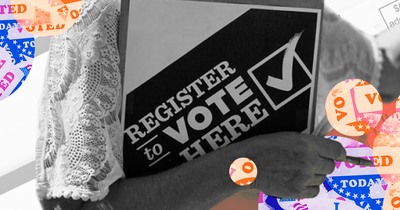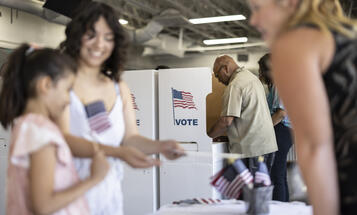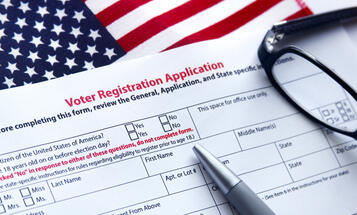
Local Groups Stop North Carolina from Silencing Black and Brown Voters
The National Voter Registration Act requires public assistance agencies to offer voter registration services, but North Carolina was failing to meet that obligation even before the pandemic. Blueprint North Carolina and others stepped in to compensate for the sake of Black and brown voters.

In the midst of a public health crisis, Blueprint North Carolina, a network of 46 organizations that advance civic and economic well-being through frames of racial equity, has performed yeoman’s work to prevent voters from being silenced. Some organizations in the network built home-grown contact lists once quarantine measures took effect, using their personal relationships and teaming up with local religious organizations. Others leveraged online events as a conduit to also round up volunteers to help people navigate the voter registration process. Making cold calls and sending texts to lists of unregistered voters, followed by guidance through voter information platforms like Rock the Vote, became a staple tactic for some smaller partners. And even while keeping individuals' immediate material needs the main focus, some groups absorbed voter registration services into their mutual aid efforts.
For Roxane Richir, Director of Field for Blueprint, civic engagement and mutual aid services are interdependent entities. “There's a long history of partners and groups and individuals who don't feel the need to make a distinction between registering voters, helping people access services, get people food, or go speak at their county commission meeting,” she said during a conversation with Demos about the network’s 2020 voter registration strategies. “It's happened before. It's happening now, and it needs to not stop.”
This labor has become even more urgent during the COVID-19 pandemic, particularly as advocates observe that fewer registrations are taking place through public assistance offices.
While always critical, this labor has become even more urgent during the COVID-19 pandemic, particularly as advocates observe that fewer registrations are taking place through public assistance offices. “We can see where voter registration applications come in from, and so we’re seeing a decline in those, possibly because some of those offices are closed, because the wait is too long, or because there’s overworked folks inside who aren’t trying to register voters anymore, or people aren’t seeking out services,” said Richir.
This finding reflects the range of complications that people face in trying to vote during this moment. It also highlights North Carolina’s failure to satisfy its legally-mandated voter registration commitments to many eligible residents, particularly low-income people of color.
When public assistance agencies offer voter registration, it expands the electorate economically and multi-racially.
When public assistance agencies offer voter registration, it expands the electorate economically and multi-racially. In 2016 Census data analyzed by Demos, we found that across the country, low-income, Black, and Latinx people registered through public assistance agencies at rates higher than their share within the total population of registered voters. Forty-nine percent of voters earning $30,000 or less annually registered in public assistance agencies, despite comprising only 11 percent of the total population. Likewise, 35 percent of Black voters and 19 percent of Latinx voters registered at public assistance agencies, while comprising only 13 percent and 10 percent of the registered voter population, respectively.
Between August and early September, nearly 1.3 million North Carolina Medicaid recipients received a voter registration application in the mail, along with an explanatory cover letter. More people will rightfully receive this mail going forward. Individuals should have been notified earlier, in many cases well before the COVID-19 shutdowns. Most were not.
The 1993 National Voter Registration Act (NVRA) established the requirement that Medicaid offices offer voter registration services. North Carolina’s Division of Health and Human Services (DHHS) administers Medicaid and its other social services programs, which means its offices must provide voter registration opportunities across a range of transactions, including certain interactions that do not happen in person. Specifically, they must offer voter registration opportunities alongside any automated benefits renewal/recertification transactions. The process, formally named ex-parte Modified Adjusted Gross Income (MAGI) recertification, was established through the Affordable Care Act, and allows DHHS to renew Medicaid benefits for certain clients using already available data, eliminating the need for face-to-face hearings. When DHHS notifies beneficiaries of their renewal outcomes—usually through mail and/or email—this notification must include voter registration forms and an offer to help individuals complete the application. DHHS disregarded these requirements.
DHHS was failing its obligations for months before the pandemic shut down its offices.
In fact, DHHS was failing its obligations for months before the pandemic shut down its offices. As of February, over 1.4 million North Carolinians were enrolled in Medicaid, of which, according to the Kaiser Family Foundation, at least three-quarters of its renewal certifications took place through the ex-parte MAGI process. The number of recipients missed through this renewal scheme could reflect voter registration challenges that a number of local public assistance offices faced. In some cases, local DHHS offices lacked the resources to handle in-person voter registration on their own; local organizations such as those within the Blueprint network consequently adapted their work to reconcile these gaps. “Some of our partners in past years partnered with some of these local social service agencies who said, ‘We just don’t have the manpower to make sure people are registered. Can you staff the lobby or staff the line outside and do that?’” said Richir, “and obviously, that’s not happening this year.”
Considered within the context of potential voter turnout, the sheer volume of residents initially ignored by DHHS bordered on calamitous. For example, when compared with North Carolina Census data, this unserved population size would have comprised nearly 16 percent of the approximately 8.2 million state residents who reached voting age by July 2019. COVID-19 either eliminated or severely reduced in-person voter registration options, which complicated the pathways to register for many eligible residents and ultimately raised their risk of becoming silenced voters.
These facts heightened the urgency for North Carolina to quickly rectify this problem. Had the state met its duties on time, it could have greatly reduced the number of people who were unnecessarily forced to seek alternative means to register—including risky in-person registrations—at a time when so many other elements of people’s lives remain fraught.
Demos and our national and state partners pushed North Carolina to meet their legal obligations.
To combat DHHS’s neglect and prevent the silencing of low-income Black and brown voters, Demos and our national and state partners pushed North Carolina to meet their legal obligations. In a June 22 letter, Demos, Southern Coalition for Social Justice, ACLU, ACLU North Carolina, and Lawyers’ Committee for Civil Rights Under Law, on behalf of Democracy North Carolina and Action NC, urged the Executive Director of the North Carolina State Board of Elections (SBE) to ensure that Medicaid recipients who have had—and will have—their benefits renewed are provided with the opportunity to register to vote, as required under the National Voter Registration Act.
In the letter, we recommended simple remedies to enable SBE and DHHS to meet full NVRA compliance. Since DHHS was already sending MAGI recertification letters, the state could simply insert a voter registration form and corresponding cover letter for all future transactions. Retrospective mailings should also go out to all eligible individuals who had their certifications renewed dating back from June 2019 through the 2020 date that DHHS implemented the policy changes going forward, which is the period when every renewal case that was processed but did not include voter registration access occurred. North Carolina SBE and DHHS officials quickly implemented the fixes.
The organizations comprising Blueprint North Carolina have exercised tremendous grit and ingenuity to compensate for the state’s errors.
The organizations comprising Blueprint North Carolina have exercised tremendous grit and ingenuity to compensate for the state’s errors. When COVID-19 hit, they shifted virtually all voter engagement activities to remote programs, and once the state eased some of its COVID-19 restrictions, Blueprint also developed contact-free programs. The hope is that North Carolina’s corrections provide some relief to the ongoing grassroots efforts, potentially enhancing the reach of any voter education and/or turnout projects that remain underway. But the extra labor that community organizations and voters absorbed was never theirs to hold. Had North Carolina officials done their jobs correctly from the outset, local groups could have worked towards other community needs.
Fortunately, North Carolina’s changes occurred just in time, as voter enthusiasm is high according to Richir. “People really want information on voting, they really want to register. That's across a lot of different demographic and income levels,” she said. “Partners aren't reporting experiencing people saying, ‘Why would I register?’ or, ‘What's it matter?’ I think they really want to know how they're supposed to register and vote this year, more than why.”
What has become clear, however, is that COVID-19 has exposed the ways that economic systems contribute to silencing voters, particularly when government fails to perform its fundamental roles. Advocates are calling for conversations at the state level to reimagine voter access and public assistance services, so both are connected to people’s overall well-being. “As we expand how we think about civic engagement to also include mutual aid, there's something about that on the state side, too,” said Blueprint Executive Director Serena Sebring. “It's like we also need to expand what we mean when we say ‘public assistance,’ to things that might not always be thought of in that way, but certainly interface with things like voter registration in a big way.”
[T]his North Carolina example shows us that states can and must comply with the law[.]
In the midst of the many threats facing our democracy, this North Carolina example shows us that states can and must comply with the law, in order to prevent consequences that affect people’s lives beyond the ballot box. If states really want to prevent the silencing of Black and brown people, they should follow North Carolina’s lead. In the meantime, Demos and our partners will continue to keep pressure on state governments to fulfill their voter registration duties as required by law, so that as many people as possible maintain access to this fundamental democratic right.




